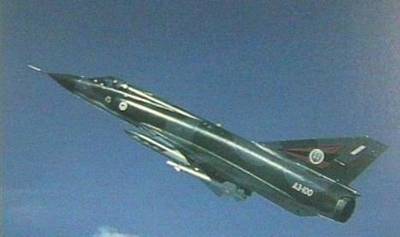"It Was A Mistake"
By ANN Correspondent Dave Bender
For the first time,
we're getting details of a mystery attack by Israeli warplanes
against an American ship, the USS Liberty, during the 1967
Arab-Israeli War. The details come from the pilot who instigated
the mistaken raid.
"There was a mistake. Mistakes happen. As far as I know, the
mistake was of the USS Liberty being there in the first
place," said Brigadier Gen. Yiftah Spector. The Jerusalem
Post reports he was given the boot by the Israeli Air Force
after protesting the policy of "target killings" against
Palestinian leaders in the West Bank and Gaza Strip.
Spector was flying a Mirage III fighter jet code named "Kursa"
(English: couch). He was the first pilot to reach the ship, about
20 nautical miles west of Gaza. Spector had been on a combat air
patrol mission. His Mirage carried no air-to-ground ordnance. The
Liberty was a US military intel-gathering ship actually
sent to support the Israelis in their war against Syria, Egypt and
other Arab countries. The Israeli air strikes against the
Liberty killed 34 US sailors and wounded 172.
"I did not fire on the Liberty as a human target. I was
sent to attack a sailing vessel. This ship was on an escape route
from the El Arish area, which at that same moment had heavy smoke
rising from it," Spector said. "It was thought to be an Egyptian
vessel. This ship positively did not have any symbol or flag that I
could see. What I was concerned with was that it was not one of
ours. I looked for the symbol of our navy, which was a large white
cross on its deck," he told the Jerusalem Post. "This was
not there, so it wasn't one of ours."

Spector is 63 now. He's a triple-ace who took part in the 1981
raid on a nuclear plant in Iraq when Israel strongly suspected
Saddam Hussein was enriching uranium. Ilan Ramon was the youngest
pilot on that mission. Earlier this year, Ramon, Israel's first man
in space, died with six other astronauts, in the disintegration of
the space shuttle Columbia.
IAF archival recordings of the pilots' radio transmission during
the 1967 attack on the Liberty were obtained by the
Post. They show Spector was specifically told to verify
that the ship was a military vessel and not Israeli.
According to the June 8, 1967, radio transmission, Spector said:
"I can't identify it but in any case it's a military ship."
Thirty-six years later,
he told the newspaper, "I circled it twice and it did not fire on
me. My assumption was that it was likely to open fire at me and
nevertheless I slowed down and I looked and there was positively no
flag. Just to make sure I photographed it," said Spector, who
retired from active duty as a brigadier-general in 1984.
The IAF, however, indicates the only photos taken of the ship
were from Spector's gun cameras, which automatically switched on
whenever he fired.
"I was told on the radio that it was an Egyptian ship off the
Gaza coast. Hit it. The luck of the ship was that I was armed only
with light ammunition [30mm] against aircraft. If I had had a bomb
it would be sitting on the bottom today like the Titanic.
I promise you," Spector said.
"The crew should be thankful for their luck [that I was on an
air-to-air mission and did not have any bombs]. It is a pity we
attacked. I'm sorry for poor Capt. (William Loren) McGonagle, who
was wounded in the leg and the other guys who were killed and
wounded."
He said he had never in the past 36 years met with any of the
Liberty survivors. Still, Spector said he has no qualms
about meeting them now.
"They must understand that a mistake was made here. The fool is
one who wanders about in the dark in dangerous places, so they
should not come with any complaints."
If that sounds a bit harsh, consider this: "I'm sorry for the
mistake. Years later my mates dropped flowers on the site where the
ship was attacked," Spector said.
"I'm the last guy who has a problem with admitting mistakes and
asking for forgiveness. There was a mistake, but it wasn't my
mistake."
 ANN's Daily Aero-Linx (12.12.25)
ANN's Daily Aero-Linx (12.12.25) ANN's Daily Aero-Term (12.12.25): Land And Hold Short Operations
ANN's Daily Aero-Term (12.12.25): Land And Hold Short Operations ANN FAQ: How Do I Become A News Spy?
ANN FAQ: How Do I Become A News Spy? NTSB Final Report: Cirrus Design Corp SF50
NTSB Final Report: Cirrus Design Corp SF50 Airborne 12.08.25: Samaritans Purse Hijack, FAA Med Relief, China Rocket Fail
Airborne 12.08.25: Samaritans Purse Hijack, FAA Med Relief, China Rocket Fail



